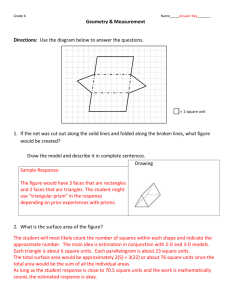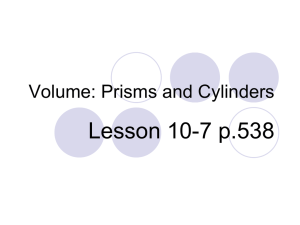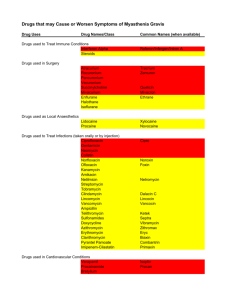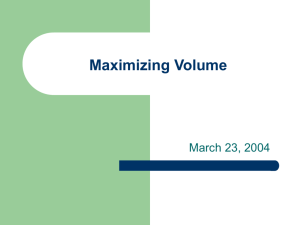What’s the Big Deal with PRISM?
advertisement
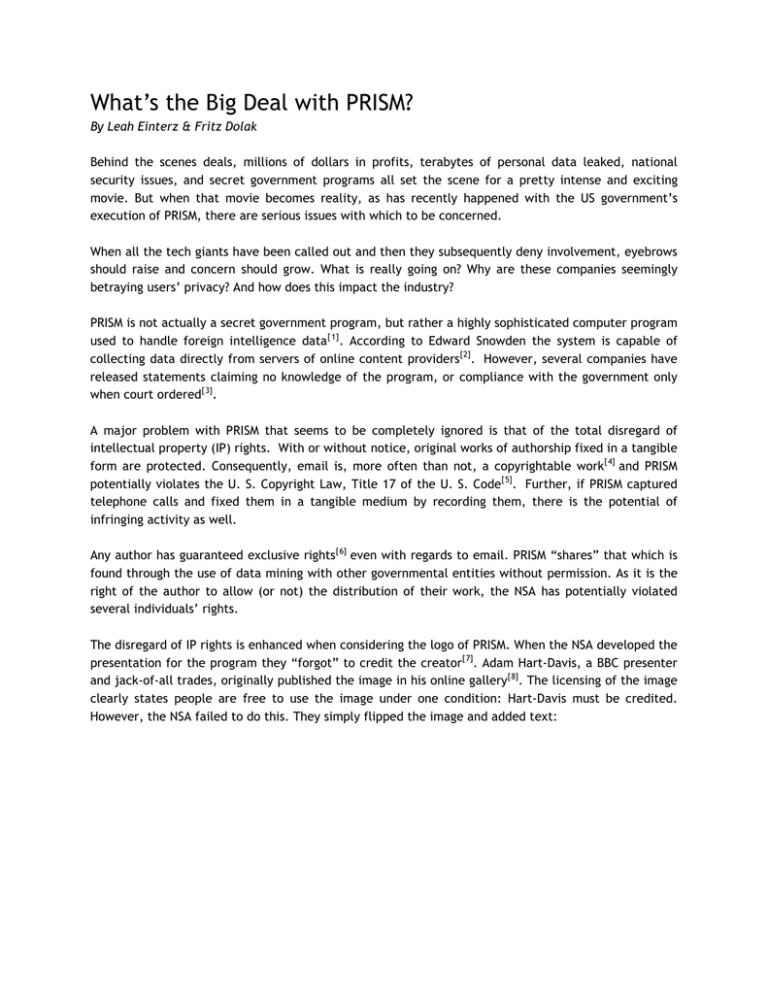
What’s the Big Deal with PRISM? By Leah Einterz & Fritz Dolak Behind the scenes deals, millions of dollars in profits, terabytes of personal data leaked, national security issues, and secret government programs all set the scene for a pretty intense and exciting movie. But when that movie becomes reality, as has recently happened with the US government’s execution of PRISM, there are serious issues with which to be concerned. When all the tech giants have been called out and then they subsequently deny involvement, eyebrows should raise and concern should grow. What is really going on? Why are these companies seemingly betraying users’ privacy? And how does this impact the industry? PRISM is not actually a secret government program, but rather a highly sophisticated computer program used to handle foreign intelligence data[ 1]. According to Edward Snowden the system is capable of collecting data directly from servers of online content providers[2]. However, several companies have released statements claiming no knowledge of the program, or compliance with the government only when court ordered[3]. A major problem with PRISM that seems to be completely ignored is that of the total disregard of intellectual property (IP) rights. With or without notice, original works of authorship fixed in a tangible form are protected. Consequently, email is, more often than not, a copyrightable work[4] and PRISM potentially violates the U. S. Copyright Law, Title 17 of the U. S. Code[5]. Further, if PRISM captured telephone calls and fixed them in a tangible medium by recording them, there is the potential of infringing activity as well. Any author has guaranteed exclusive rights[6] even with regards to email. PRISM “shares” that which is found through the use of data mining with other governmental entities without permission. As it is the right of the author to allow (or not) the distribution of their work, the NSA has potentially violated several individuals’ rights. The disregard of IP rights is enhanced when considering the logo of PRISM. When the NSA developed the presentation for the program they “forgot” to credit the creator[7]. Adam Hart-Davis, a BBC presenter and jack-of-all trades, originally published the image in his online gallery[8]. The licensing of the image clearly states people are free to use the image under one condition: Hart-Davis must be credited. However, the NSA failed to do this. They simply flipped the image and added text: Privacy and government regulation become major concerns when issues like PRISM arise. One of the more worrisome situations from this ordeal is that US lawmakers allude to this only being the beginning of these issues[9]. Although briefings were used to reassure lawmaker the legality of the program, how far is too far for the government to regulate? All of the major tech companies say they only worked with the government when forced to. However, the government is the regulating body that controls which companies merge and how strictly an industry is watched. So it is no surprise the companies were willing to work with the government without much fight. Furthermore, when a company is restricted by a government gag order, it is difficult for them to do much more than what they are told[10]. Consider this: a teenage girl wants to go on a date with an older boy. However, her dad is slightly overprotective and requires her to be home by 9pm and she has to tell him exactly where and when they are going. The girl agrees to her father’s conditions and is allowed to date the boy. However, the father is not satisfied. He proceeds to not only track her via GPS in her phone, he also gets a record of her text messages and emails from their phone provider. Whether or not he finds the information he is looking for, he has full access to everything. Some would argue he’s just being a good father and watching out for his daughter. However, many would disagree and say he’s overreaching and her freedom was sacrificed. What’s the Big Deal with PRISM? Violation of privacy, intellectual property laws including copyright and patents, as well as the Fourth Amendment are all potential issues[11]. 1 http://www.vanityfair.com/online/eichenwald/2013/06/prism-isnt-data-mining-NSA-scandal http://www.washingtonpost.com/blogs/wonkblog/wp/2013/06/12/heres-everything-we-know-aboutprism-to-date/ 3 http://www.businessweek.com/articles/2013-06-07/the-companies-lines-on-prism 2 4 102. Subject matter of copyright: In general http://www.copyright.gov/title17/ 6 http://www.copyright.gov/title17/92chap1.html#106 7 http://www.theregister.co.uk/2013/06/12/nsa_logo_scandal/ 8 http://gallery.hd.org/_c/natural-science/prism-and-refraction-of-light-into-rainbow-2AJHD.jpg.html 9 http://thehill.com/video/house/305047-dem-rep-lawmakers-learned-significantly-more-aboutsurveillance-programs-in-nsa-briefing 10 http://www.techradar.com/news/world-of-tech/google-challenges-fisa-court-s-gag-order-overprism-1159977 11 http://www.law.cornell.edu/constitution/fourth_amendment 5
